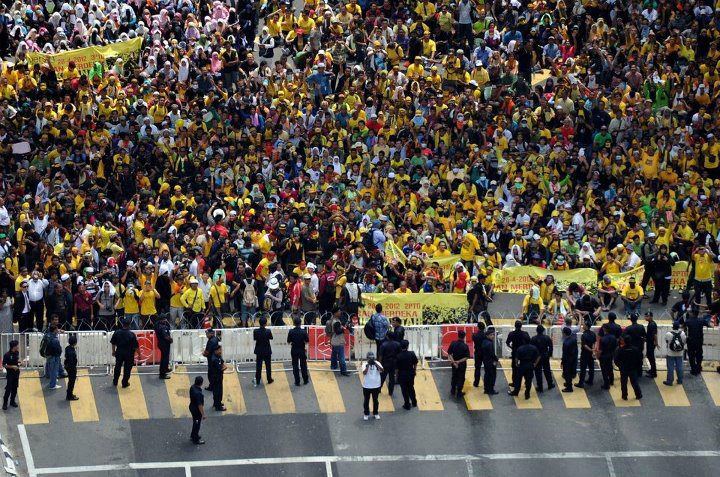Malaysian Prime Minister Najib Razak’s popularity took a hit following a harsh crackdown on demonstrators at July’s 2011 Bersih rally. Looking to salvage his image as a reformer, Najib immediately set up a Parliamentary Select Committee (PSC) to look into the issue of electoral reform.
But if he was hoping this move alone would appease critics and aid his political brand, he appears to have been gravely mistaken: the bar has since been raised, and to meet it, Najib must up the reformist ante and learn to sell policies more effectively to an increasingly skeptical electorate.
Saturday saw the Malaysian Bersih movement hold its third and biggest rally yet for electoral reform: some estimates have the number of attendees at 300,000 for the Kuala Lumpur event. Bersih “solidarity rallies” also took place in eighty-five other locations across the world, adding to the momentum already mustered from the two previous rallies.
But what had for several hours been a peaceful protest quickly took a violent turn when a small group of protesters appeared to breach the barbed wire and barricades set up by police to keep the protestors out of Kuala Lumpur’s iconic Independence Square (Dataran Merdeka).
Tear gas and water cannons were fired at demonstrators. South Australian Senator Nick Xenophon, who was in the country as an international observer, was one of those tear gassed. Several journalists reported having their equipment destroyed as they tried to film some of the chaos and violence, with one Al-Jazeera correspondent having to file a report using Skype.
But images of groups of policemen attacking demonstrators have found their way onto social networking sites, where they have been readily shared amongst Malaysian users. Some 512 people were arrested by the close of the day.
Gloves came off quickly in the ensuing blame game, with rally organisers insisting the violence only started after the tear gas was used. Politicians from the Barisan Nasional (BN) coalition, which has ruled Malaysia for over five decades, lined up to point the finger at Bersih and demonstrators.
The Minister for Home Affairs, Hishammuddin Hussein, retweeted one tweet likening some of the participants to “thugs”, and said the police had behaved professionally. Deputy Prime Minister Muhyiddin Yassin likened the situation to a “riot”, and Barisan Nasional (BN) and United Malays National Organisation (UMNO) youth leader Khairy Jamaluddin blamed the violence on the presence of opposition leader Anwar Ibrahim.
But many Malaysians are wearing none of it, especially with audio visual evidence in cyberspace to the contrary, and since the international observers invited by Anwar Ibrahim to observe the rally have also rejected the charges. Cynicism towards the “old guard” is increasing, especially amongst young urban voters who have grown impatient at the mainstream media bias and widespread marginalisation they have known all their lives.
BN needs a game change. Or some time out.
 Facebook
Facebook  Twitter
Twitter  Soundcloud
Soundcloud  Youtube
Youtube  Rss
Rss 